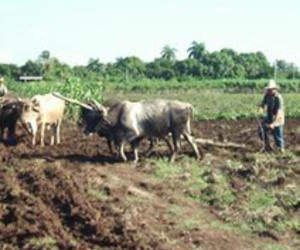Urban gardens in Cuba
- Submitted by: manso
- Business and Economy
- 04 / 07 / 2011

Santiago de las Vegas, Cuba (Reuters) - Urban gardens in Cuba like this one, in the town of Santiago de las Vegas in Havana Province, have been touted by government officials as the way of the future for Cuban agriculture.
Retiree-turned-farmer Raul Hayes Fernandez is one of more than 128,000 would-be farmers who have been leased fallow state lands over the last two years.
The scheme is part of economic reforms President Raul Castro says are crucial to ensuring that the communist system put in place in Cuba five decades ago survives once its aging leaders are gone. But many Cubans say more change is still needed and hope it will come with the Communist Party's first congress in 14 years, which will get underway in just two weeks time. Farmers are expected to raise a number of complaints, especially about the price and availability of tools and materials.
"I wasn't always a farmer. I was a manager for 48 years. I finished, retired and now here I am doing what I have to do," Hayes Fernandez said.
Fresh produce is still restricted at local markets, and even the Communist Party accepts the reforms have not done enough so far to raise food production.
Buyers complain that only at the highly expensive "boutique" markets, where only the rich can afford to shop, can one find everything on their shopping list.
"There still isn't enough. Because if you go to what they call the "boutique" market there is everything. Here there are two or three things on sale. But it is alright, I mean I live in Playa and it is awful there. But still," said 23-year-old information technology student, Mayli Buso. Some already say they are happy with the changes. "We are very happy with the market today. There is a lot of produce for the people," said 62-year-old retiree, Oreste Hernandez Castillo.
Others, as often happens in Cuba, choose not to give an opinion on the reforms.
"I don't know. I don't know what to tell you," said one market seller who withheld their name.
Some farmers have been given permits to to sell crops on the open market and prices previously fixed at a low level are now revised every month. Before some farmers would feed their crops to their animals because it wasn't worth selling at the price the government paid. Yet ranch owners, like Raul Chavez Garcia, say the government should just open the floodgates entirely.
"I think something will change [in the Communist Party meeting], they have to open the doors for the farmers to sell directly to the market, because out here we have the food," Chavez Garcia said.
Although thousands of new farmers are tilling fertile fields that had been abandoned for decades, making farms and other ventures productive is still a hurdle facing Cuba.
Nearly half of all farm land is still idle.
In the meantime expensive food exports continue to cut into the national budget while farmers just do what they can with the resources they have. "I am trying to solve some of our problems here. At the moment we have problems in agriculture - with drought, because many people don't understand that the well-being of everyone starts here," Hayes Fernandez said.
Raul Castro wants to transform Cuba's social system from one based on collective work and consumption to one where markets, individual initiative and reward play larger roles and targeted welfare replaces cradle-to-grave subsidized goods and services. His government is upbeat about its progress and believes the way to the future has already been laid.
"We have shown that we can produce food with high returns, high quality and big benefits to the producer and the people. Today we would say that urban agriculture is the agriculture of the future," said Agriculture Ministry's spokesman for Urban Agriculture, Nelson Companioni.
Just how many changes will be made and how far the reforms will reach will be a whole lot clearer when the Party congress starts on April 16.
Source: www.ntn24news.com/latinamericanews/4511-urban-gardens-cuba
Comments